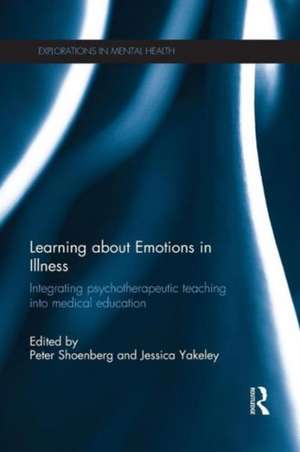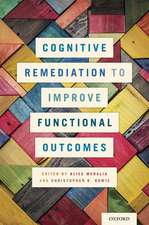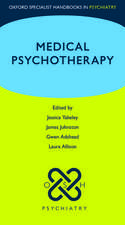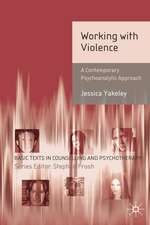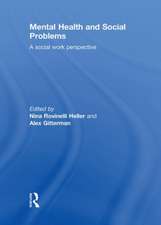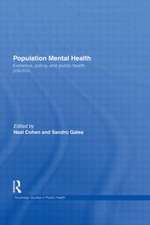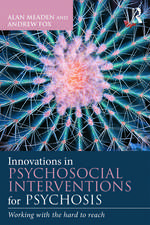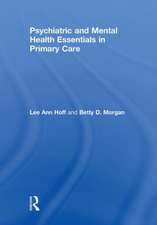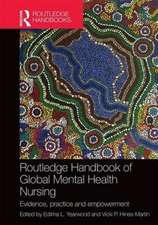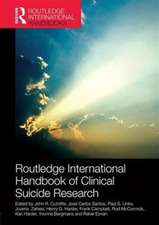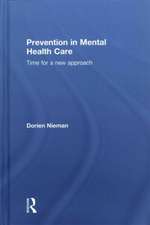Learning about Emotions in Illness: Integrating psychotherapeutic teaching into medical education: Explorations in Mental Health
Editat de Peter Shoenberg, Jessica Yakeleyen Limba Engleză Paperback – 12 oct 2015
In this book, Peter Shoenberg, Jessica Yakeley, and their contributors who include students and teachers, discuss two different teaching approaches developed at University College London to help medical students understand the role of emotions in illness, communicate more effectively, and gain a deeper understanding of the doctor patient relationship. The benefits of Ball, Wolff and Tredgold’s Student Psychotherapy Scheme are considered alongside Shoenberg and Suckling’s short term student Balint discussion group scheme to provide clear guidance about how psychotherapeutic understanding can be used to inform medical education, with positive results.
At a time when medicine is becoming increasingly technological and there is a growing demand by the public for more psychologically minded doctors, this book will be a key resource for physicians, general practitioners, psychologists, psychiatrists and psychotherapists who are involved in medical teaching and for medical students.
| Toate formatele și edițiile | Preț | Express |
|---|---|---|
| Paperback (1) | 424.99 lei 6-8 săpt. | |
| Taylor & Francis – 12 oct 2015 | 424.99 lei 6-8 săpt. | |
| Hardback (1) | 1093.01 lei 6-8 săpt. | |
| Taylor & Francis – 27 mar 2014 | 1093.01 lei 6-8 săpt. |
Din seria Explorations in Mental Health
- 8%
 Preț: 374.75 lei
Preț: 374.75 lei - 5%
 Preț: 138.47 lei
Preț: 138.47 lei - 5%
 Preț: 237.89 lei
Preț: 237.89 lei - 5%
 Preț: 348.63 lei
Preț: 348.63 lei - 5%
 Preț: 939.49 lei
Preț: 939.49 lei - 5%
 Preț: 272.19 lei
Preț: 272.19 lei -
 Preț: 144.85 lei
Preț: 144.85 lei - 5%
 Preț: 351.10 lei
Preț: 351.10 lei -
 Preț: 325.70 lei
Preț: 325.70 lei -
 Preț: 435.17 lei
Preț: 435.17 lei -
 Preț: 399.41 lei
Preț: 399.41 lei - 5%
 Preț: 1155.09 lei
Preț: 1155.09 lei - 18%
 Preț: 1166.35 lei
Preț: 1166.35 lei - 11%
 Preț: 814.37 lei
Preț: 814.37 lei -
 Preț: 367.89 lei
Preț: 367.89 lei -
 Preț: 372.84 lei
Preț: 372.84 lei - 5%
 Preț: 1351.06 lei
Preț: 1351.06 lei - 5%
 Preț: 452.22 lei
Preț: 452.22 lei - 9%
 Preț: 899.59 lei
Preț: 899.59 lei - 5%
 Preț: 306.82 lei
Preț: 306.82 lei - 5%
 Preț: 432.08 lei
Preț: 432.08 lei -
 Preț: 399.41 lei
Preț: 399.41 lei -
 Preț: 464.49 lei
Preț: 464.49 lei - 5%
 Preț: 458.23 lei
Preț: 458.23 lei - 5%
 Preț: 369.92 lei
Preț: 369.92 lei - 5%
 Preț: 382.02 lei
Preț: 382.02 lei - 11%
 Preț: 811.19 lei
Preț: 811.19 lei - 21%
 Preț: 876.29 lei
Preț: 876.29 lei - 18%
 Preț: 949.28 lei
Preț: 949.28 lei - 5%
 Preț: 333.00 lei
Preț: 333.00 lei - 5%
 Preț: 452.77 lei
Preț: 452.77 lei - 18%
 Preț: 945.80 lei
Preț: 945.80 lei -
 Preț: 183.94 lei
Preț: 183.94 lei - 5%
 Preț: 1346.31 lei
Preț: 1346.31 lei
Preț: 424.99 lei
Preț vechi: 447.35 lei
-5% Nou
Puncte Express: 637
Preț estimativ în valută:
81.32€ • 84.91$ • 67.15£
81.32€ • 84.91$ • 67.15£
Carte tipărită la comandă
Livrare economică 15-29 aprilie
Preluare comenzi: 021 569.72.76
Specificații
ISBN-13: 9781138189119
ISBN-10: 1138189111
Pagini: 194
Dimensiuni: 156 x 234 x 10 mm
Greutate: 0.25 kg
Ediția:1
Editura: Taylor & Francis
Colecția Routledge
Seria Explorations in Mental Health
Locul publicării:Oxford, United Kingdom
ISBN-10: 1138189111
Pagini: 194
Dimensiuni: 156 x 234 x 10 mm
Greutate: 0.25 kg
Ediția:1
Editura: Taylor & Francis
Colecția Routledge
Seria Explorations in Mental Health
Locul publicării:Oxford, United Kingdom
Public țintă
Postgraduate and ProfessionalCuprins
Foreword Gary Rodin Introduction Peter Shoenberg 1. The UCL Student Psychotherapy Scheme Jessica Yakeley 2. Experiences of Supervisors on the UCL Student Psychotherapy Scheme Christine Van Duuren and Jennifer Johns 3. Students’ Experiences of the UCL Student Psychotherapy Scheme Jessica Yakeley, Robbie Bunt, Elsa Gubert and Caroline Hulsker 4. The Bristol Student Psychotherapy Scheme Ray Brown and Thanos Tsapas 5. Developing Student Balint Groups Peter Shoenberg and Heather Suckling 6. Professional Identity and Confusion of Boundaries Sotiris Zalidis 7. Students’ Experiences of Being in a Balint Group Noah Moran, Lara Curran and Paul Sackin 8. Research Jessica Yakeley 9. Conclusion Peter Shoenberg
Notă biografică
Peter Shoenberg is Honorary Consultant Psychiatrist in Psychotherapy at the Camden Psychodynamic Psychotherapy Service for the Camden and Islington NHS Foundation Trust, UK. He is involved in running student Balint discussion groups and supervising students on the Student Psychotherapy Scheme at University College London, UK.
Jessica Yakeley is Consultant Psychiatrist in Forensic Psychotherapy at the Portman Clinic and Associate Medical Director and Director of Medical Education at the Tavistock and Portman NHS Foundation Trust, UK.
Jessica Yakeley is Consultant Psychiatrist in Forensic Psychotherapy at the Portman Clinic and Associate Medical Director and Director of Medical Education at the Tavistock and Portman NHS Foundation Trust, UK.
Recenzii
"the book is of enormous value in keeping alive the essential work of understanding emotions in illness and describing how patient-centred care can be acheived. It eloquently makes the case that such training should ideally be available nationally for medical and other students. The organizers and participants in this work deserve great praise for developing the scheme and keeping it going. Long may it continue and, hopefully, this book will bring it to a wider audience." - John Hook, Consultant Medical Psychotherapist, Private Practice, British Journal of Psychotherapy.
'The book is excellent. It presents the perspectives of scheme leaders, psychotherapists, GPs, and medical students as psychotherapists and Balint group members in a richly reflective narrative style...If we view this book as a text about how to educate medical students, humanistically, amongst all the dangers of reality it is to be commended far beyond a small circle of psychodynamically-minded educators. The authors deserve our admiration for what they have achieved and thanks for making it so accessible. I commend it to anyone who wants to apply the wisdom of the past to the uncertain future of preparing people to be good doctors.' - Tim Dornan, Professor of Medical And Interprofessional Education, Queen's University Belfast, UK, and Emeritus Professor, Maastricht University, NL for Psychoanalytic Psychotherapy
'Reading Learning About Emotions in Illness, I found myself reflecting on my emotional response to the book - I was moved, and surprised at being moved. Partly, it reminded me of my own time as a medical student participating in the student psychotherapy scheme, which gave me my first opportunity of being useful as a trainee doctor, as opposed to being someone in the way... Partly, I was simply moved by some of the accounts of people who as students had participated in either of the schemes described in the book, as they grappled with their own and their patients' emotional responses, especially to physical illness.' - Paramabandhu Groves, Bulletin of the Royal College of Psychiatrists
'This book valuably addresses the question of how medical students can learn to recognise and harness their own, and their patients', emotions in practice, rather than the traditional course of suppressing them ... In summary, the book is an excellent addition to literature on teaching medical students and should be seen by all medical teachers. It makes an inspiring read.' - D. Watt, Journal of the Balint Society
‘This book succeeds in providing an enthralling overview of the endeavours, advantages, difficulties and outcomes arising from the idea originally formulated by Balint, of regaining the emotional access to the sick person that largely went missing in the industrial age, and to make this part of doctors’ training: from ‘illness-centred medicine’ to ‘patient-centred medicine’. A very worthwhile and readable book with a narrative flow, recommended for anyone engaged in medical training and further education, but also for colleagues who wish to reflect on their daily life in medicine.’ - Heide Otten, Wienhausen, Past President of the International Balint Federation, in the Balint Journal, 2/14
‘Learning to be a doctor is not just about swinging a stethoscope, sharpening a scalpel, or shaking a test tube. It is also about learning how to talk to people, and how to understand about emotions - both those experienced by the patient, and those by the doctor. Student psychotherapy schemes play an important role in developing these essential skills. They also can be an important rite of passage as the student starts to mature into the doctor. Certainly in my own education I remember that this was the first time in my student career that my teachers were interested in my own opinions, and not just as a way of showing me how wrong they were, and the first time I was given a real, and not fake, task to complete and responsibility to assume. It was one of the reasons that I, and many other students exposed to similar experiences, decided that psychiatry might be for me. I strongly believe that every medical school in the land should host a student psychotherapy scheme, and this book tells you both how and why.’ - Professor Simon Wessely, Professor of Psychiatry, King’s College London, UK
‘This lively book is clearly written and illustrated with freshly described, first-hand accounts from students who have been therapists or group participants, and doctors who have been supervisors or Balint leaders in the University College Student Psychotherapy or Student Balint group schemes. The authors argue that this approach complements the now routine core communication skills teaching for medical students, and the vignettes certainly make the case that the experience encourages students to think about their own emotional responses as well as the patient’s state of mind.’ - Professor Patricia Hughes, Dean for Staff and Student Affairs, Professor of Psychiatry and Education, St George's, University of London, UK
‘In learning to listen, doctors need to recognise and understand their emotional responses to patients. Medical schools do now include some communication skills training but this cuts little ice in the face of the old institutionalised mantra, ‘don’t get involved’. This excellent and timely book describes the scheme developed by University College over many years in which students are introduced to thinking more deeply about the emotional experience of their clinical work. The present volume will be invaluable to all those involved in establishing similar schemes in other medical schools - as well as to students, tutors, general practitioners, psychiatrists and psychotherapists who remain committed to improving this aspect of medical training.’ - Dr Andrew Elder FRCGP, Consultant in General Practice and Primary Care, UK
'The book is excellent. It presents the perspectives of scheme leaders, psychotherapists, GPs, and medical students as psychotherapists and Balint group members in a richly reflective narrative style...If we view this book as a text about how to educate medical students, humanistically, amongst all the dangers of reality it is to be commended far beyond a small circle of psychodynamically-minded educators. The authors deserve our admiration for what they have achieved and thanks for making it so accessible. I commend it to anyone who wants to apply the wisdom of the past to the uncertain future of preparing people to be good doctors.' - Tim Dornan, Professor of Medical And Interprofessional Education, Queen's University Belfast, UK, and Emeritus Professor, Maastricht University, NL for Psychoanalytic Psychotherapy
'Reading Learning About Emotions in Illness, I found myself reflecting on my emotional response to the book - I was moved, and surprised at being moved. Partly, it reminded me of my own time as a medical student participating in the student psychotherapy scheme, which gave me my first opportunity of being useful as a trainee doctor, as opposed to being someone in the way... Partly, I was simply moved by some of the accounts of people who as students had participated in either of the schemes described in the book, as they grappled with their own and their patients' emotional responses, especially to physical illness.' - Paramabandhu Groves, Bulletin of the Royal College of Psychiatrists
'This book valuably addresses the question of how medical students can learn to recognise and harness their own, and their patients', emotions in practice, rather than the traditional course of suppressing them ... In summary, the book is an excellent addition to literature on teaching medical students and should be seen by all medical teachers. It makes an inspiring read.' - D. Watt, Journal of the Balint Society
‘This book succeeds in providing an enthralling overview of the endeavours, advantages, difficulties and outcomes arising from the idea originally formulated by Balint, of regaining the emotional access to the sick person that largely went missing in the industrial age, and to make this part of doctors’ training: from ‘illness-centred medicine’ to ‘patient-centred medicine’. A very worthwhile and readable book with a narrative flow, recommended for anyone engaged in medical training and further education, but also for colleagues who wish to reflect on their daily life in medicine.’ - Heide Otten, Wienhausen, Past President of the International Balint Federation, in the Balint Journal, 2/14
‘Learning to be a doctor is not just about swinging a stethoscope, sharpening a scalpel, or shaking a test tube. It is also about learning how to talk to people, and how to understand about emotions - both those experienced by the patient, and those by the doctor. Student psychotherapy schemes play an important role in developing these essential skills. They also can be an important rite of passage as the student starts to mature into the doctor. Certainly in my own education I remember that this was the first time in my student career that my teachers were interested in my own opinions, and not just as a way of showing me how wrong they were, and the first time I was given a real, and not fake, task to complete and responsibility to assume. It was one of the reasons that I, and many other students exposed to similar experiences, decided that psychiatry might be for me. I strongly believe that every medical school in the land should host a student psychotherapy scheme, and this book tells you both how and why.’ - Professor Simon Wessely, Professor of Psychiatry, King’s College London, UK
‘This lively book is clearly written and illustrated with freshly described, first-hand accounts from students who have been therapists or group participants, and doctors who have been supervisors or Balint leaders in the University College Student Psychotherapy or Student Balint group schemes. The authors argue that this approach complements the now routine core communication skills teaching for medical students, and the vignettes certainly make the case that the experience encourages students to think about their own emotional responses as well as the patient’s state of mind.’ - Professor Patricia Hughes, Dean for Staff and Student Affairs, Professor of Psychiatry and Education, St George's, University of London, UK
‘In learning to listen, doctors need to recognise and understand their emotional responses to patients. Medical schools do now include some communication skills training but this cuts little ice in the face of the old institutionalised mantra, ‘don’t get involved’. This excellent and timely book describes the scheme developed by University College over many years in which students are introduced to thinking more deeply about the emotional experience of their clinical work. The present volume will be invaluable to all those involved in establishing similar schemes in other medical schools - as well as to students, tutors, general practitioners, psychiatrists and psychotherapists who remain committed to improving this aspect of medical training.’ - Dr Andrew Elder FRCGP, Consultant in General Practice and Primary Care, UK
Descriere
In this book, Peter Shoenberg, Jessica Yakeley, and their contributors discuss two different teaching approaches developed at University College London to help medical students understand the role of emotions in illness, communicate more effectively, and gain a deeper understanding of the doctor patient relationship. The benefits of Wolf and Treadgold’s Student Psychotherapy Scheme are considered alongside Schoenberg and Suckling’s Balint Scheme to provide clear guidance about how psychotherapeutic theory can be used to inform medical education, with positive results.
